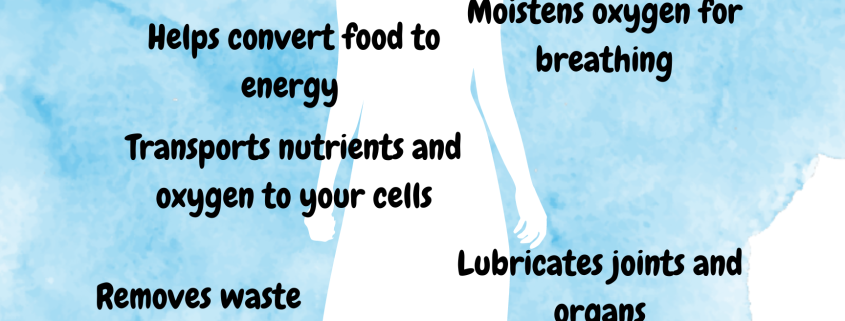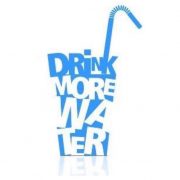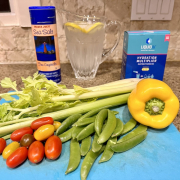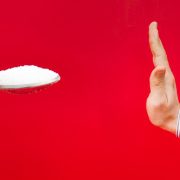Eat Your Water
Did you know that fatigue and brain fog can be early signs of dehydration?
Even the smallest amount of dehydration can have a big impact. 2% dehydration can cause cognitive impairment. That’s about 33 ounces of water. By mid-afternoon low-grade dehydration causes energy to slump.
Water is the most important nutrient your body needs. If you feel foggy or unfocused, water can provide immediate help. Studies show that even mild dehydration lowered women’s concentration levels and they performed poorly on tests that measured cognition and focus. When they were fully hydrated, they were able to perform the same tests well. Dehydration also lowers mood. Research shows that neurons in your brain can sense early warning signs of dehydration and alert other neurons that regulate mood.
Repeated dehydration accelerates aging. Chronic dehydration is also linked to increased risk of Alzheimer’s.
Staying hydrated helps your brain by
- transporting oxygen to your cells
- improving cell-to-cell communication
- flushes toxins
- empowers your body’s natural healing processes
Cut back on coffee, skip juices, sodas and artificially flavored waters. Drink filtered water. Make your own flavored water with fresh fruit, or herbs. How much water to drink? Pay attention to your body. Symptoms of early dehydration – besides fatigue and brain fog – include
- headaches
- constipation
- irritability, mood imbalances
- stiffness
Getting hydration from water and food is the best strategy to absorb water.
How to best absorb water
Water locked in plants hydrates more efficiently and more fully than plain water. Water in plants is already purified, alkaline, mineralized, full of nutrients and easily absorbed into your cells. And plant fiber helps you absorb all that liquid and keeps it in your system longer because you absorb it more slowly.
Water-rich foods are nutrient-rich, packed with antioxidants, vitamins, and minerals; calcium, magnesium, potassium and sodium are activated by the electrical charge in water, hello electrolytes. Water conducts electricity not only for fuel but for cognition, judgment, and mood. Aim to get more veggies than fruit.
| Top 12 Hydrating Veggies
(percent water)
|
Top 12 Hydrating Fruits
(percent water) |
| Cucumbers 96.7% | Starfruit 91.4% |
| Romaine 95.6% | Watermelon 91.4% |
| Celery 95.3% | Strawberries 91% |
| Radishes 95.3% | Grapefruit 90.5% |
| Zucchini 95% | Cantaloupe 90.2% |
| Tomato 94.5% | Pineapple 87% |
| Peppers 93.9% | Raspberries 87% |
| Cauliflower 92.1% | Blueberries 85% |
| Spinach 91.4% | Kiwi 84.2% |
| Broccoli 90.7% | Apples 84% |
| Carrots 90% | Pears 84% |
| Sprouts 86.5% | Grapes 81.5% |
When you get more water from plants, you are also giving bacteria in your gut the nutrients, fiber and water they need. Your gut is part of your central nervous system and is often referred to as the “second brain”. Many neurotransmitters are produced by your gut such as
- Serotonin which contributes to feeling happy
- GABA which helps control feelings of anxiety and fear
The “second brain” in your gut is in communication with the brain in your head, and plays a key role in diseases and in overall mental health.
What to do?
- After waking up drink 8 – 16 ounces of water with 1 spoon of lemon juice and a pinch of sea salt
- Front-load your hydration early in the day, it will be easier for your body to stay hydrated this way
- Drink water before each meal (rather than during your meal)
- Get more water from food – eating foods high in water content keep you hydrated longer
- Listen to your body – fatigue (especially afternoon crash) and brain fog are early signals of dehydration
- Limit water/liquid one hour before bedtime
Resources
Fruit infused water – The Free Range Life
How to make the healthiest green smoothie – Downshiftology
Cold Soup Recipes – Love and Lemons
References
Cohen, Dana, Bria, Gina. (2018). Quench: Beat fatigue, drop weight, and heal your body through the new science of optimum hydration. New York, NY: Hachette Book Group.
Popkin, Barry M., D’Anci, Kristen E. and Rosenberg, Irwin H. (2010). Water, Hydration and Health. Nutrition Review. 68(8); 439 – 458. https.www.ncbi.nlm.nih.gov/pmc/articles/PMC2908954/
Riebl, Shaun K, Davy, Brenda. M. (November/December 2013). The Hydration Equation: Update on Water Balance and Cognitive Performance. ACSMs Health Fit J. 17(6); 21 – 28.
https.www.ncbi.nlm.nih.gov/pmc/articles/PMC4207053/#R3







Leave a Reply
Want to join the discussion?Feel free to contribute!